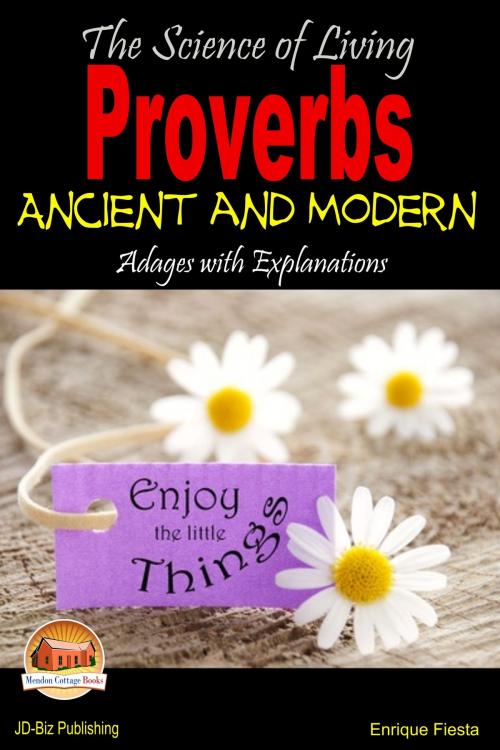The Science of Living: Proverbs: Ancient and Modern Adages with Explanations
Nonfiction, Reference & Language, Reference, Guides & Handbooks| Author: | Enrique Fiesta | ISBN: | 9781310758652 |
| Publisher: | Mendon Cottage Books | Publication: | February 11, 2015 |
| Imprint: | Smashwords Edition | Language: | English |
| Author: | Enrique Fiesta |
| ISBN: | 9781310758652 |
| Publisher: | Mendon Cottage Books |
| Publication: | February 11, 2015 |
| Imprint: | Smashwords Edition |
| Language: | English |
Table of Contents
Introduction
Adages with Explanations
Author Bio
Publisher
Introduction
I find that one of the ways to cut through the complexity of everyday life and simplify my experience of things is to rely upon the wisdom of our ancestors. Adages are one the greatest ways to do this, because they are the distilled wisdom of over 60,000 years of human history.
They are often incisive, direct, and to the point. If we apply them earnestly to our own life situations we will often find that their wisdom flies far higher than our own ideas and contrivances.
The adage, unfortunately, has lost its prestige in the modern era for a number of reasons, but probably the most significant one is that modern readers do not like to be lectured nor preached to. An adage, unlike an analytic argument or witty retort, acquires its force not from the ingenuity of an individual but from its historicity and ancient pedigree. In this regard, an adage is similar to a Bible verse. Many secular persons despise having the Bible quoted at length to support an argument against them since they do not believe in, trust, nor particularly care for the ancient wisdom of the Bible- they generally share the same disdain for ancient adages since they are often rooted in the genius of a race of people rather than in a clever person’s ability to churn out witty statements.
Adages also carry with them a moralistic tone which censures unreasonable, bad, and slothful behavior. Modern man, with his obsequious desire for licentiousness and indifference, tends to reject wisdom and knowledge which he is unable to access with his meager powers. Autonomy is prized as the chief good in modern society. Unfortunately, autonomy and licentiousness are not the chief goods of existence-rather, existence itself is prior in the order of importance since autonomy and license could not exist without existing first. It is the nature of existence that we must study if we are to discover true happiness. Modern man’s worship of autonomy will only, in the end, leave him grasping for answers and truths in a chaotic world.
Table of Contents
Introduction
Adages with Explanations
Author Bio
Publisher
Introduction
I find that one of the ways to cut through the complexity of everyday life and simplify my experience of things is to rely upon the wisdom of our ancestors. Adages are one the greatest ways to do this, because they are the distilled wisdom of over 60,000 years of human history.
They are often incisive, direct, and to the point. If we apply them earnestly to our own life situations we will often find that their wisdom flies far higher than our own ideas and contrivances.
The adage, unfortunately, has lost its prestige in the modern era for a number of reasons, but probably the most significant one is that modern readers do not like to be lectured nor preached to. An adage, unlike an analytic argument or witty retort, acquires its force not from the ingenuity of an individual but from its historicity and ancient pedigree. In this regard, an adage is similar to a Bible verse. Many secular persons despise having the Bible quoted at length to support an argument against them since they do not believe in, trust, nor particularly care for the ancient wisdom of the Bible- they generally share the same disdain for ancient adages since they are often rooted in the genius of a race of people rather than in a clever person’s ability to churn out witty statements.
Adages also carry with them a moralistic tone which censures unreasonable, bad, and slothful behavior. Modern man, with his obsequious desire for licentiousness and indifference, tends to reject wisdom and knowledge which he is unable to access with his meager powers. Autonomy is prized as the chief good in modern society. Unfortunately, autonomy and licentiousness are not the chief goods of existence-rather, existence itself is prior in the order of importance since autonomy and license could not exist without existing first. It is the nature of existence that we must study if we are to discover true happiness. Modern man’s worship of autonomy will only, in the end, leave him grasping for answers and truths in a chaotic world.















